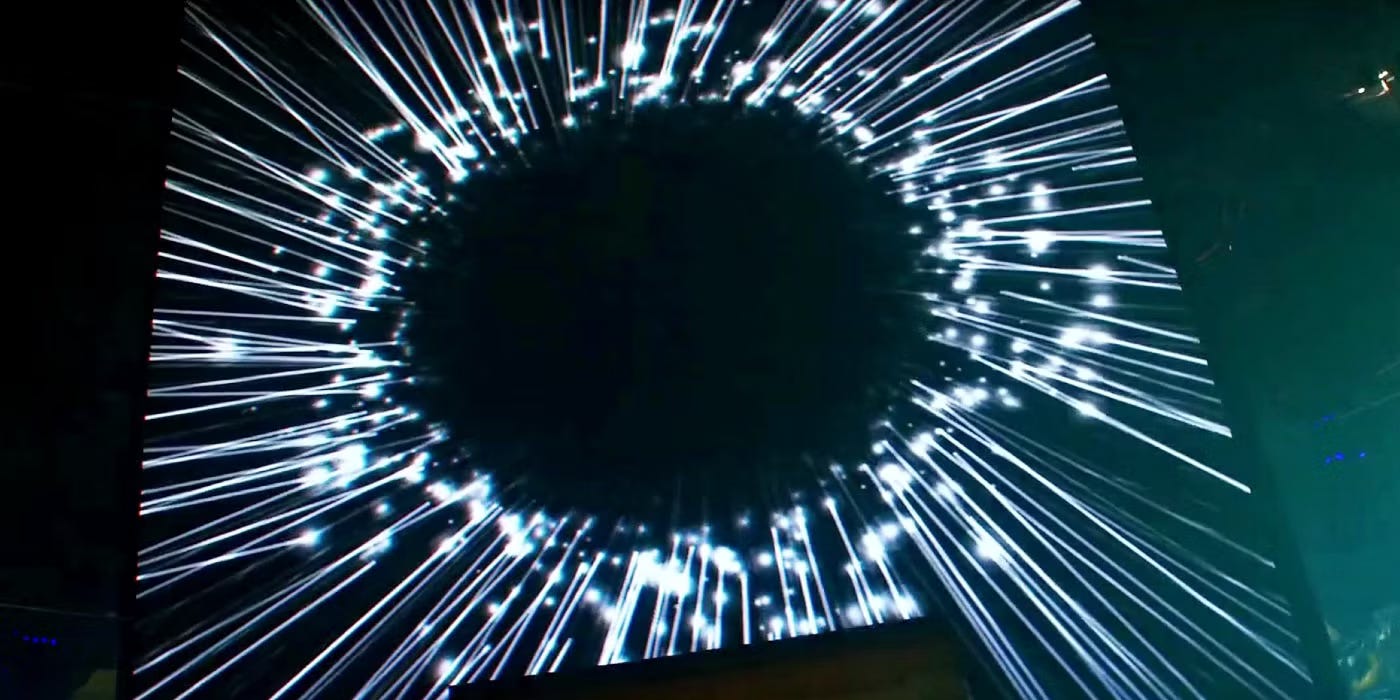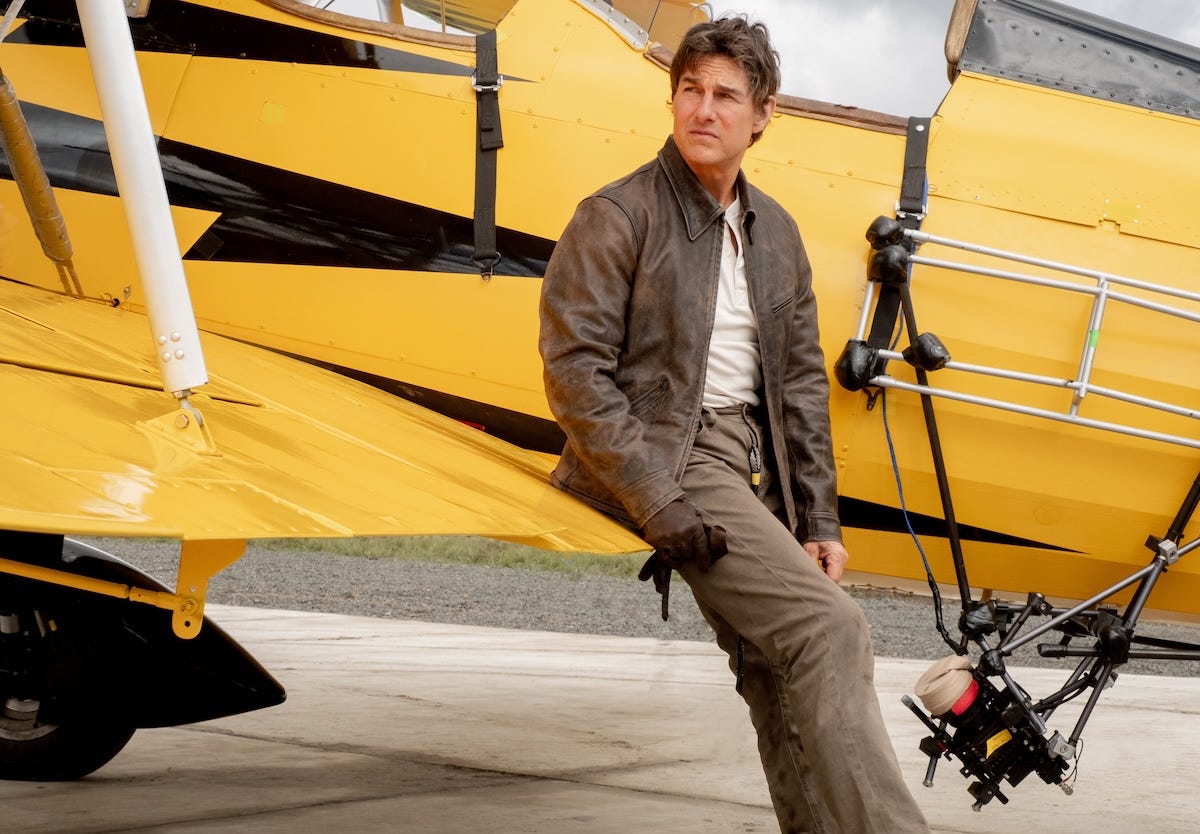
The Woke Right Wants to Cancel Ms Rachel
May 23, 2025
Will Democrats Learn From the Biden Disaster? Probably Not.
May 23, 2025It is tempting to think of the callbacks in Mission: Impossible—The Final Reckoning as an aggressive exercise in franchise nostalgia, a near-30-year series flexing a little to remind folks that even someone with as little screentime as a CIA tech with an upset tummy in the initial outing is a classic character worthy of redemption by Ethan Hunt (Tom Cruise) and his team.
But there’s more to the return of William Donloe (Rolf Saxon) than simple fan service. His secure CIA database in the first movie way back in 1996 was notable not just for its impenetrability—to all except Luther (Ving Rhames), aka Phineas Phreak, naturally—but also its inaccessibility. It was offline, secure in part because it couldn’t be reached by hackers. You remember the scene: Ethan dropping by wires so as not to touch the pressure-sensitive floor; obsessively controlling his own body heat so as not to trip the temperature sensors. The names of the agents on that database were protected by being kept from the digital ether, period. Breaching those analog defenses with digital weaponry in that first film was like letting the snake into Eden.
The series has grown up with the internet alongside the rest of us; in hindsight, there’s a funny moment where we learn the villain’s email is “Max@Job 3:14,” an address that would totally work. But only in hindsight for most of us, given the levels of digital penetration in 1996, when AOL was still a relatively unusual luxury and only one in five Americans was online. Between the time that movie was filmed and its sequel debuted in 2000, Pew reports that more than half of the country was online. Twenty-five years later, everyone walking into Final Reckoning—a rousing conclusion to the first major franchise of the digital age—carried the internet into the theater with them in their pocket.
At this, “the Entity” might smile.

A preoccupation with the internet and its effects pervades both The Final Reckoning and its predecessor in the series, Dead Reckoning. The Entity—an unholy offspring created when an American spy program mated with a Russian super-submarine, a combination that makes roughly as much technical sense as an email address with a biblical verse in the place of a domain name—can run so many computations and so accurately work percentages that it can, functionally, see the future. More importantly than that, though, it can change the past. Or, at least, how we perceive the past, what we believe to be real about the past.
“Whoever controls the Entity controls the truth. The concepts of right and wrong can be clearly defined for everyone for centuries to come,” says Eugene Kittridge (Henry Czerny), another character returning from the initial entry in the series. The nation in control of this manufactured truth will gain access to Earth’s “dwindling resources”; everyone else will be forced to choke on the ashes. And we see that manipulation of the truth in The Final Reckoning’s opening moments, the Entity changing images of school buses into tanks. Or vice versa, perhaps. Who can say? As one character puts it in the early moments, ominously sounding a bit like Galadriel in the opening voiceover of The Fellowship of the Ring, “The world is changing. Truth is vanishing. War is coming.” Though how much control of the truth matters is in some question, since the Entity has seized control of half of the world’s nuclear powers’ armaments. Only the United States, China, Russia, and Great Britain remain unaffected, and those nations are falling off the big board in rapid succession, unable or unwilling to take their own arsenals offline because, in a post-truth society, no one knows whom to trust.
What the Entity wants and how it hopes to achieve it are, frankly, immaterial; what matters are the images we see and then don’t see, the information it can create and blink out of existence. At one point, the Entity subjects Ethan to a barrage of future images in a sarcophagus-like tank; as he spills out of it, shaking from exhaustion and terror, he asks and then exclaims, “You’re real? You’re real!” as he holds on to Grace (Hayley Atwell). It feels like fate that this movie would drop the same weekend that Google’s Veo 3 granted folks the ability to create news broadcasts out of whole cloth, a tool making it easier than ever to manufacture untrue truths, one that will cripple our intellectual defenses and divide people with falsehoods via text prompt.
For all the gadgets and doodads, Mission: Impossible has always been an analog series struggling within a digital world. Yes there are digital head-up displays and hacks, but the series’s best bit has always been the masks, a physical tactile thing that agents pull off of their faces at surprising moments, proving their mastery at in-person infiltration. More than that, though, is the physicality of the filmmaking itself, Tom Cruise’s near-maniacal insistence he do his own stunts (or, at least, as many of them as are physically feasible) rather than rely on digital fakery. From hanging off the side of a speeding airplane to diving hundreds of feet to recover a submarine core to running (always running, forever running), Ethan Hunt is a man in motion, either under his own power or hanging off of something with a motor.
The series as a whole has often treated the plot as little more than an excuse to get to the stunts, but it feels like there’s something a bit more urgent in Final Reckoning, that Cruise and writer-director Christopher McQuarrie have more to say. This is one reason the film is a little long; it’s overstuffed with ideas and supporting characters and side missions. Yet it never really feels long, at least in part because Cruise has assembled an all-star class of supporting actors; Trammel Tillman, most recently of Severance fame as Mr. Milchick, is the standout here, generating appreciative laughs as a stern submarine captain. Indeed, there’s a sly sense of humor to the whole proceedings, another reason it flies along; at one point late in the film, Ethan climbs up the undercarriage of a conveyance and gives its operator—who is staring at the IMF agent, mouth agog—an almost apologetic shrug of the shoulders as if to say “I don’t know, man, your guess is as good as mine as to what I’m doing up here.”
What Ethan’s doing, of course, is saving the day. And what Cruise is doing is trying to save the entire industry of filmmaking as we know it, as if his exertions can prove the importance and the viability of the star-driven blockbuster, as if the wind blowing into his cheeks as he straddles a biplane’s landing strut, hundreds of feet in the air, can also blow life back into the artform he has dedicated his life to.

Cruise feels like the last of a certain kind of star, at least at his wattage. He happened to be in my town, Dallas, yesterday, and I wanted to see the effect he had. I’d gotten word he was going to be at one theater for an outro and an intro, and I pulled up to the theater just in time to see his convoy—four or five black SUVs with a multi-vehicle police escort shutting down side streets, calling to mind a vice-presidential motorcade for this former D.C. resident—speeding away. Still, I popped in to see how audiences had taken being graced with his presence and it’s fair to say that the mood was one of swooning.
Most of the day’s action took place at the AMC Northpark, one of the busiest movie theaters in the country. The buzz Cruise brought to the venue was almost palpable; I spend a lot of time at the Northpark, and I’ve never seen it like this. The staff was in a tizzy too; one worker I chatted up briefly said they’d been working for AMC for more than a decade and “it’s never been like this. It’s good to have this kind of excitement.” Cruise and the folks at Paramount had commandeered the IMAX theater for private screenings and he and McQuarrie were popping into some showings to say hi, so lots of folks were just kind of milling around hoping to catch a glimpse of one of the last living megastars.
I was one of the millers, wandering around a bit and soaking it all up while sipping on a beer waiting for the 8:30 screening I had a ticket for to start. And then, all of a sudden, security stepped in to clear a path and there he was, ducking out of one auditorium, into a private lounge area. Flashing the smile. Accompanied by McQuarrie, who always looks a little bemused by the pomp and circumstance of being next to one of the most recognizable men in the world. Cruise was out in the open for about four seconds and the energy it generated among the assembled is almost embarrassingly hard to describe.
I don’t know what the future of movies and movie theaters holds. Maybe it’ll all disappear soon. If it does, I’ll miss these splashes of energy, these moments of weird camaraderie as strangers gather to experience a communal event in multiplexes around the country.
Great Job Sonny Bunch & the Team @ The Bulwark Source link for sharing this story.








